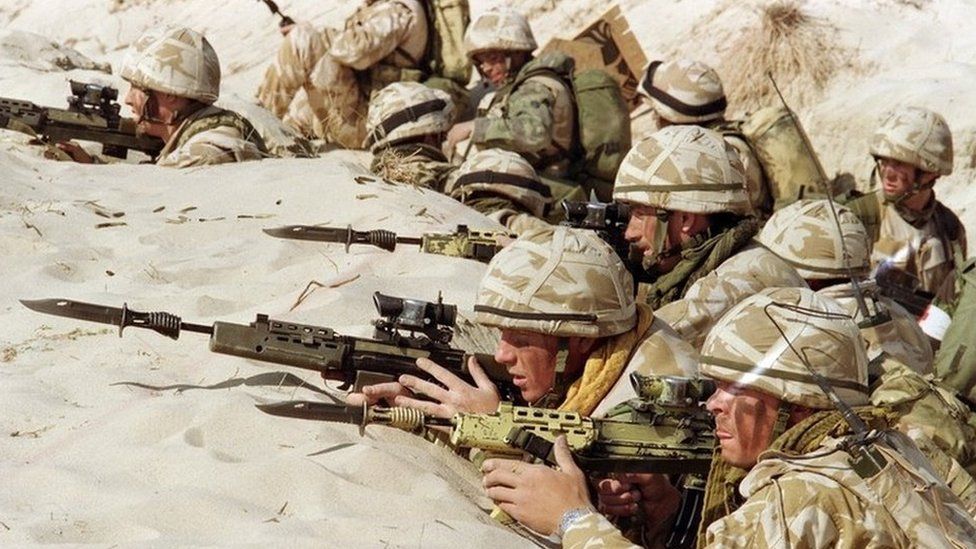The condition may be due to soldiers being exposed to the nerve agent sarin, researchers suggest.

image copyrightGetty Images
An illness suffered by soldiers who took part in the Gulf War was not caused by inhaling depleted uranium, according to a scientific study.
Instead, researchers believe Gulf War syndrome may be due to soldiers being exposed to the nerve agent sarin.
The Royal British Legion said a lack of understanding of the condition has had a “serious impact” on veterans.
The Ministry of Defence said it has no plans to conduct further studies but would monitor any research published.
Researchers estimate around 250,000 Gulf War veterans could be living with the syndrome – which can cause symptoms such as insomnia and memory problems.
Former soldier Kerry Fuller was a fit 26 year old who loved outdoor activities prior to the 1991 war.
He suffered a stroke at 40 and now says he is so ill, it is hard just to get out of bed.
“My whole world and way of being changed just like that,” he told the BBC’s Caroline Hawley. “And there’s no going back. The damage is done and my ailments are only getting worse.
“I think myself and the thousands of other veterans would just like an acknowledgment, and being able to then move forward with the knowledge of what caused things, to access the correct treatment.”
Scientists have been trying to work out for years what could be the cause of Gulf War syndrome.
One popular theory was that soldiers had become ill after exposure to depleted uranium in tank shells.
Researchers from the University of Portsmouth tested those with the condition to examine levels of residual depleted uranium in their bodies.
They say their study “conclusively proves” that none of them were exposed to any significant amounts.
Professor Randall Parrish said the results of the study would “surprise many” who have long suspected that exposure to the chemical could have contributed to their illness.
Researchers now believe the most likely culprit is exposure to the nerve agent sarin – which was released into the atmosphere when Iraqi chemical weapons caches were bombed.
They say steps meant to protect the soldiers could have compounded the problem – including anti-nerve agent medication and the extensive use of pesticides.
Pesticides were sprayed on tents and other equipment such as uniforms, and were used on skin as an insect repellent during the war to prevent malaria exposure.
“Being able to debunk the alleged connection between this illness and this radioactive substance allows the medical community to focus more clearly on what the likely causes actually are,” Prof Parrish said.
“Finding causes is a nebulous game when you have so many options to blame.
“The allies’ own activities destroying an Iraqi nerve agent cache or spraying pesticides liberally on troops could be seen in hindsight as an inadvertent ‘own goal’ and one to be avoided in future conflicts.
“It is important to find causes for conditions like this, even if it takes a long time and the causes might be controversial.”
The Royal British Legion said research suggested up to 33,000 UK Gulf War veterans could be living with the syndrome, with 1,300 claiming a war pension for conditions connected to their service.
Andy Pike, head of policy and research at the charity, said: “Whilst we welcome further research that helps to improve our knowledge of the experiences faced by Gulf War veterans, there has been little meaningful research published in the UK concerning effective treatment for those suffering from Gulf War illnesses.
“It is likely this lack of understanding has had a serious impact, leaving many veterans living with debilitating conditions 30 years after the end of combat operations.”
A Ministry of Defence spokesman said: “We are indebted to all those who served our country in the Gulf wars and have already sponsored significant research into the effects of this conflict on veterans.
“Although we have no plans to conduct further studies, we continue to monitor any Gulf War research that is published around the world.”